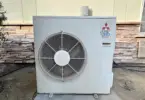Your air conditioning system no longer necessitates the use of Freon refrigerant unless there is a detected leak in the cooling mechanism. Gradual leaks can occur over time, causing damage to the air conditioner and incurring significant replacement costs. If you’re questioning whether your central air conditioners use Freon, and if it requires recharging, a solution is at hand.
Modern, eco-friendly refrigerants are gradually replacing Freon, though your air conditioner may have initially used Freon upon purchase. Systems using Freon require recycled Freon for recharging after January 2020, and it’s crucial not to add Freon unless there’s a confirmed leak.
Removing Freon from Central AC
The new cooling systems no longer use Freon, prompting curiosity about when central air conditioners ceased employing it. Some suggest filling the central air conditioner with Freon until the house can no longer be adequately cooled, and charging with Freon is an option in case of leaks. However, the cost of Freon can be prohibitive, and accessing recycled Freon might be challenging. Freon recharging is not a routine task; it should only be done if a leak is identified by a technician.
Before considering a Freon charge, conduct a thorough inspection of your system to ensure warm air is not escaping from the vents.
Determining Freon Usage in Central AC
To ascertain whether your system uses Freon, consult with an expert, considering the system’s manufacturing date. Understanding Freon’s role in air conditioning involves the compression of cold Freon gas, heating it during compression, and its transformation into a liquid through a cooling process. While the system operates continuously in a closed environment, refrigerant may still need to be added in the case of leaks.
Leaks
Technicians need to identify and fix leaks before adding Freon. If the leak persists, refrigerant may be required again. In some cases, replacing the central air conditioner might be a more cost-effective solution, considering the expense of Freon replenishment.
Repairing Leaks
If a copper coil leak is detected, professionals determine repair costs based on the location and severity of the leak. Common troubleshooting steps include using dyes or specialized equipment to locate leaks, removing all Freon from the system, repairing the leaks, recharging the central AC unit, and testing its proper functionality.
Recharging Home AC with Freon
The cost of adding Freon to a system typically ranges from $100 to $350, excluding labor costs. Oversized air conditioners may incur higher costs, reaching up to $600. Additionally, disposing of old Freon may add an extra charge ranging from $50 to $150, considering that refrigerants require proper disposal by authorized personnel.
Conclusion
With evolving standards, older central air conditioners use Freon, while newer models utilize more efficient refrigerants. Whether to recharge your existing system or invest in a new one depends on your assessment of the information provided.
Disclosure: We may get commissions for purchases made through links in this post.








